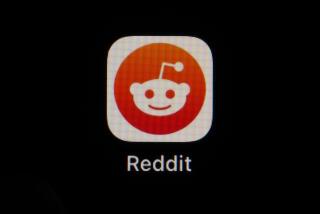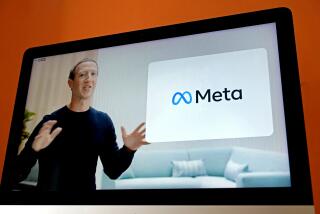Facebook is moving carefully toward IPO
SAN FRANCISCO — The countdown to Facebook Inc.’s initial public stock offering has officially begun.
The social networking giant is aiming to begin selling its stock to the public in May and is taking carefully choreographed steps to prepare for what is expected to be the biggest-ever Internet IPO, said a person familiar with the situation who is not authorized to speak publicly.
Facebook has asked private exchanges to halt trading of the privately held company’s shares Friday. Within a few weeks, Facebook is expected to kick off its so-called road show to court institutional investors such as pension funds, mutual funds and hedge funds, the person said.
Facebook’s chief operating officer, Sheryl Sandberg, and Chief Financial Officer David Ebersman will lead the marketing of the IPO with founder and Chief Executive Mark Zuckerberg playing a smaller role, said Sam Hamadeh, head of PrivCo, a research firm specializing in the financials of private companies. A video made for the road show could be posted as early as Monday, he said.
Facebook held a preliminary meeting with top analysts and bankers at its Menlo Park, Calif., headquarters last week. Zuckerberg skipped that meeting, which was led by Sandberg and Ebersman.
Facebook is in a “quiet period,” during which federal rules limit what the company can say publicly. Jonathan Thaw, a Facebook spokesman, declined to comment.
The moves are routine for companies readying for an IPO, analysts said.
“Facebook is doing everything possible to make this an orderly opening,” said Scott Sweet, senior managing partner at IPO Boutique.
Facebook has been methodically preparing for the IPO for two years. Ebersman, who as Genentech Inc.’s finance chief helped close the $46-billion deal in 2009 that made Roche Holdings the full owner of the biotechnology company, has professionally audited Facebook’s financial statements each quarter to avoid the kinds of accounting problems that other Internet companies have encountered and even wrote the first draft of the IPO prospectus himself, a task usually left to the bankers.
The timing of the IPO, which depends in large part on regulatory scrutiny, could still change. But Facebook’s filing with the Securities and Exchange Commission has not encountered any significant problems that would hold up the IPO, Hamadeh said.
Facebook has filed several amendments to the IPO plan, the latest one warning investors of the material risk of an “unfavorable outcome” in a patent infringement lawsuit that Yahoo recently filed.
“It has been pretty much a class act,” Hamadeh said.
Facebook asked for the trading halt on the secondary market so it could pin down how many shareholders it has and put a stop to wild swings in the stock. Shares of Facebook trade on private exchanges where investors and early employees can sell their holdings.
Demand for the company’s shares have soared on the secondary market since Facebook filed for an IPO on Feb. 1. The IPO could raise as much as $10 billion and value the company at more than $100 billion. Recent trades on the secondary market give Facebook an implied valuation of more than $100 billion.
“I have never seen anything like it,” Hamadeh said.
More to Read
Inside the business of entertainment
The Wide Shot brings you news, analysis and insights on everything from streaming wars to production — and what it all means for the future.
You may occasionally receive promotional content from the Los Angeles Times.










